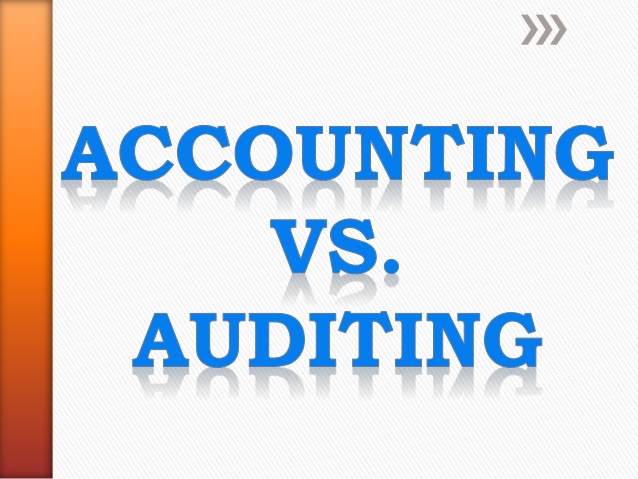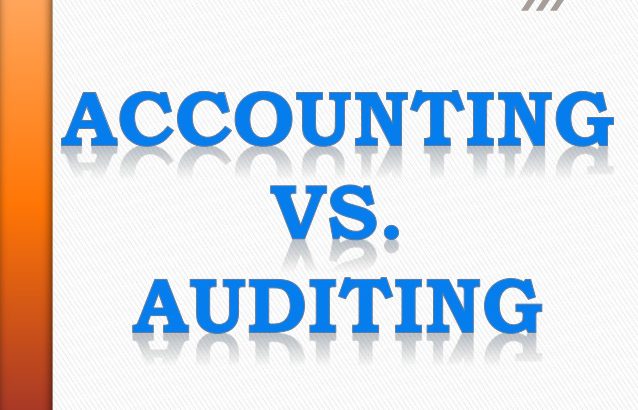What’s the difference between an accountant and an auditor? 会计师和审计师的区别是什么?
The accountant and auditor roles are often confused for each other. With many differences and similarities; the two functions are sometimes interchangeable. 会计师和审计师的角色经常互相混淆。有许多不同和相似之处;这两个功能有时是可互换的。
Accountants 会计师
Accountants accumulate daily financial transactions and report on the performance, financial position and cash flows of a business. Duties can include governing the customer receipts and vendor payments function and can extend to payroll, end-of-month and end-of-year reconciliations. An accountant’s duties may vary depending on the type of accountant such as a financial, tax or management accountant. 会计人员收集每天的财务交易,并报告企业的业绩、财务状况和现金流。职责包括管理客户收据和供应商付款功能,并可扩展到工资、月末和年末的核对。会计师的职责可能会根据不同的会计类型而有所不同,如财务、税务或管理会计师。
The primary objective of accounting includes record keeping through journals, ledgers, trial balances and the compilation of financial statements that detail the profit and loss result and financial position. 会计的主要目的包括通过日记账、分类账、试算表和编制财务报表来记录,这些报表详细说明了损益结果和财务状况。
Auditors 审计师
Auditors are responsible for providing an independent and objective opinion of an entity’s financial position and performance at balance date. Auditing is a critical, unbiased analysis of financial and non-financial information resulting in the transparency and accuracy of financial data. Audit procedures can include examining accounting records, testing internal controls and obtaining third party confirmations of certain matters at balance date. Auditors can also improve efficiency in operations and increase financial reliability and integrity. Similar to accountants, an auditor’s duties may vary depending on the type of audit being an internal audit or external audit. 审计师有责任对一个实体在平衡日的财务状况和业绩提供独立和客观的意见。审计是对财务和非财务信息的一种批判性、无偏倚的分析,其结果是财务数据的透明度和准确性。审计程序可以包括检查会计记录,测试内部控制和在结算日获得第三方对某些事项的确认。审计师还可以提高运营效率,提高财务可靠性和完整性。与会计师一样,审计师的职责可能会因内部审计或外部审计的审计类型而有所不同。
The primary objective of auditing is to provide an independent opinion (unmodified or modified) on the financial statements at balance date. An unqualified audit opinion provides reasonable assurance to users of financial reporting that the financial statements are free from any material misstatement. 审计的主要目的是对财务报表平衡日提供独立的意见(未经修改或修改的)。无保留的审计意见为财务报告的使用者提供合理的保证,即财务报表不存在任何重大错报。
The differences 二者差异
- Accounting usually starts where bookkeeping ends, while auditing starts where accounting ends. 会计通常始于簿记结束的地方,而审计则始于会计结束的地方。
- Accounting is constant, whereas auditing is periodic (bi-annually or annually). 会计是固定的,而审计是定期的(两年或一年)。
- Accounting is governed by the Accounting Standards Council (ASC) and Financial Reporting Standards (FRS) and auditing is governed by the Singapore Standards on Auditing (SSAs). 会计由会计准则理事会(ASC)和财务报告准则(FRS)管理,审计由新加坡审计准则(SSAs)管理。
- Accountants can often be employees of a company for which they work, whereas auditors are externally engaged to provide an independent opinion. 会计人员通常是他们所工作的公司的雇员,而审计师则是外部聘请来提供独立意见的。
- All financial auditors are accountants, but not all accountants are financial auditors. 所有的财务审计师都是会计师,但不是所有的会计师都是财务审计师。
The similarities 相似之处
- Accountants and auditors both require a thorough knowledge of accounting procedures and processes and usually hold an accounting degree. 会计师和审计师都要求对会计程序和流程有全面的了解,通常都持有会计学位。
- Accountants and auditors work together to ensure the company’s records accurately reflect its financial position. 会计师和审计员一起工作,以确保公司的记录准确反映其财务状况。
Whilst the scope of an audit is often wider than accounting, both roles are specialist fields requiring clear understanding of an entity’s industry, accounting standards, regulations and rulings. Although auditing may not always be mandatory to your organisation; accounting is, with its primary intention to provide guidance for economic decisions of a company. 虽然审计的范围通常比会计更广,但这两个角色都是需要清楚了解实体的行业、会计标准、法规和裁决的专业领域。虽然审核不一定是强制性的;会计的主要目的是为公司的经济决策提供指导。
Responsibilities of Management and Directors for the Financial Statements 管理层和董事对财务报表的责任
Management is responsible for the preparation of financial statements that give a true and fair view in accordance with the provisions of the Act and FRSs, and for devising and maintaining a system of internal accounting controls sufficient to provide a reasonable assurance that assets are safeguarded against loss from unauthorised use or disposition; and transactions are properly authorised and that they are recorded as necessary to permit the preparation of true and fair financial statements and to maintain accountability of assets. 管理层负责根据《公司法》和《财务报告准则》的规定编制真实、公正的财务报表,以及设计和维持一套内部会计控制制度,足以提供合理保证,确保资产免受未经授权使用或处置造成的损失;交易得到适当授权,并在必要时予以记录,以便编制真实、公正的财务报表,以及保持资产的责任。
In preparing the financial statements, management is responsible for assessing the Company’s ability to continue as a going concern, disclosing, as applicable, matters related to going concern and using the going concern basis of accounting unless management either intends to liquidate the Company or to cease operations, or has no realistic alternative but to do so. 在编制财务报表时,管理层负责评估公司持续经营的能力,在适用的情况下披露与持续经营有关的事项,并使用持续经营的会计基础,除非管理层打算清算公司或停止经营,或者除了这样做别无选择。
The directors’ responsibilities include overseeing the Company’s financial reporting process. 董事的职责包括监督公司的财务报告程序。
Auditor’s Responsibilities for the Audit of the Financial Statements 审计师对财务报表的审计责任
Auditors’ objectives are to obtain reasonable assurance about whether the financial statements as a whole are free from material misstatement, whether due to fraud or error, and to issue an auditor’s report that includes their opinion. Reasonable assurance is a high level of assurance, but is not a guarantee that an audit conducted in accordance with SSAs will always detect a material misstatement when it exists. Misstatements can arise from fraud or error and are considered material if, individually or in the aggregate, they could reasonably be expected to influence the economic decisions of users taken on the basis of these financial statements. 审计师的目标是对财务报表整体是否不存在由于舞弊或错误导致的重大错报获取合理保证,并出具包含其意见的审计师报告。合理的保证是一种高水平的保证,但并不能保证根据SSAs进行的审计在其存在时总是会发现重大的错报。错报可由欺诈或错误引起,如果可以合理地预期错报单独或合计会影响用户根据这些财务报表作出的经济决策,则错报被视为重大错报。
As part of an audit in accordance with SSAs, auditors exercise professional judgement and maintain professional scepticism throughout the audit. Auditors also: 作为审计工作的一部分,审核员在整个审计过程中进行专业判断并保持专业怀疑态度。审计人员也:
- Identify and assess the risks of material misstatement of the financial statements, whether due to fraud or error, design and perform audit procedures responsive to those risks, and obtain audit evidence that is sufficient and appropriate to provide a basis for their opinion. The risk of not detecting a material misstatement resulting from fraud is higher than for one resulting from error, as fraud may involve collusion, forgery, intentional omissions, misrepresentations, or the override of internal control. 识别和评估由于舞弊或错误导致的财务报表重大错报风险,设计和执行应对这些风险的审计程序,并获取足够和适当的审计证据,为其发表意见提供依据。由于欺诈可能涉及串通、伪造、故意遗漏、虚假陈述或凌驾于内部控制之上,因此不发现欺诈导致的重大错报的风险高于错误导致的重大错报的风险。
- Obtain an understanding of internal control relevant to the audit in order to design audit procedures that are appropriate in the circumstances, but not for the purpose of expressing an opinion on the effectiveness of the Company’s internal control. 对与审计相关的内部控制有一定的了解,以便设计出适当的审计程序,但不是为了对公司内部控制的有效性发表意见。
- Evaluate the appropriateness of accounting policies used and the reasonableness of accounting estimates and related disclosures made by management. 评估使用的会计政策的适当性和会计估计的合理性以及管理层作出的相关披露。
- Conclude on the appropriateness of management’s use of the going concern basis of accounting and, based on the audit evidence obtained, whether a material uncertainty exists related to events or conditions that may cast significant doubt on the Company’s ability to continue as a going concern. If auditors conclude that a material uncertainty exists, they are required to draw attention in the auditor’s report to the related disclosures in the financial statements or, if such disclosures are inadequate, to modify their opinion. Their conclusions are based on the audit evidence obtained up to the date of the auditor’s report. However, future events or conditions may cause the Company to cease to continue as a going concern. 总结管理层使用持续经营会计基础的适当性,并基于获得的审计证据,是否存在与事件或条件有关的重大不确定性,这可能对公司作为持续经营的持续能力产生重大怀疑。如果审计师认为存在重大不确定性,则要求他们在审计报告中注意财务报表中的相关披露,或者如果披露不充分,则修改其意见。他们的结论是基于截至审计报告日期所获得的审计证据。但是,未来的事件或情况可能会导致公司不再继续经营。
- Evaluate the overall presentation, structure and content of the financial statements, including the disclosures, and whether the financial statements represent the underlying transactions and events in a manner that achieves fair presentation. 评估财务报表的整体列报、结构和内容,包括披露,以及财务报表是否以公平的方式反映了基本的交易和事项。
Auditors communicate with the directors regarding, among other matters, the planned scope and timing of the audit and significant audit findings, including any significant deficiencies in internal control that they
identify during their audit. 除其它事项外,审计员就审计的计划范围和时间以及重大审计结果,包括他们在审计期间发现的内部控制方面的任何重大缺陷,与董事进行沟通。


